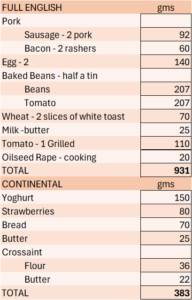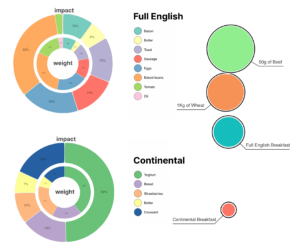If you cook on gas, the carbon cost of your breakfast is easy enough to calculate, and so in fact are the “Scope 3” ingredients – but what about the “nature” cost? Eating less meat reduces carbon emissions, and also the nature or biodiversity impact.
Klere has developed a unique methodology which can tell you the impact of each ingredient of your breakfast, so if you want to reduce your impact, you can make an informed choice – is it the beans or the bacon that should go?
In terms of the ingredients listed on the right, the Full English comes in at 2.4 times the weight and 2.5 the nature impact of a Continental, but you get only 1.5 times the calories. The Continental breakfast provides 1.6 times the calories per ‘biodiversity unit’.
The pie charts below show where the impact falls and compares the two breakfasts to the impact of 1kg of wheat and 50kg of beef. Meat and dairy are high impact products.
So, sadly for your local greasy spoon, it looks as though the Continental wins out – although nutritionists would advise you to go with protein for a longer lasting effect than the higher sugar alternative. We will model that next.
You might say we have simply spent a lot of time putting numbers on what is intuitively obvious – but why this matters is that we provide the quantum. You can gauge the impact of changing some of the ingredients (supply chain) rather than others: cut out the meat and you reduce impact by 20%; cut out the meat and one egg and you are down 33%. You can make rational choices.
In a future blog we will be showing what this means on a national scale and how companies can use the methodology, (which is underpinned by Natural England’s habitat classification and the UK’s DEFRA Metric) across their supply chain.
If you would like to more about how Klere can help you calculate your nature impact, email us on office@klere.uk.



